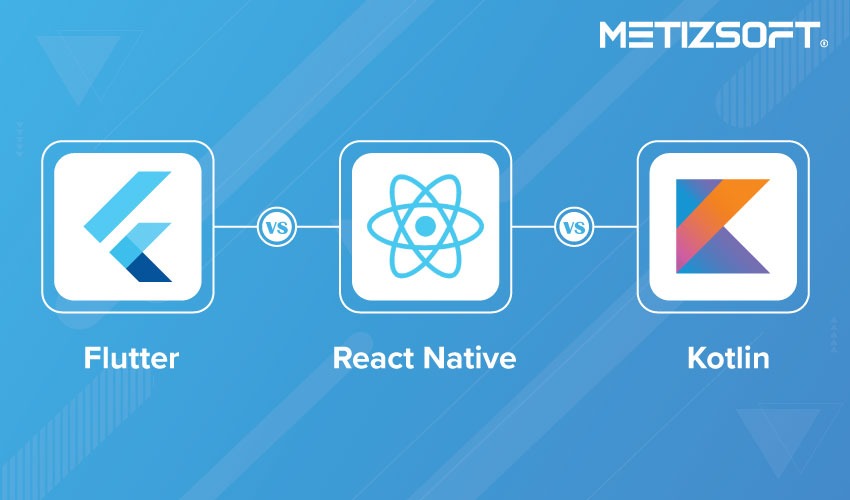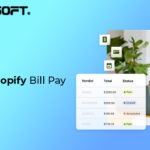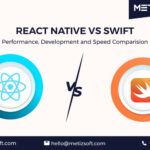
The tech-savvy urge to deliver the best possible app development solution with minimal cost and effort has led to numerous adoption and creativity.
In contrast, many front-line enterprises and startups have started to use highly scalable and functional cross-platform frameworks for mobile app development. Hence the battle between React Native, Flutter, and Kotlin always sounds interesting.
Due to their staggering offerings, these three mobile app development frameworks have managed to be on the first choice list of developers and enterprises.
However, a discussion/debate always erupts whenever someone claims one among these three as the “best mobile app development framework.”
Anyway, let us not be influenced by anyone’s opinion and find out the best app development framework between React Native Vs. Flutter Vs. Kotlin following the below comparison.
Table of Contents
React Native – Must-know factors!
React Native was introduced by then Facebook, now Meta in 2015 is a JavaScript-based open-source framework. Due to its cross-platform compatibility, single codebase, and reliable functionalities, it has become many enterprises’ first choice for web, desktop, and mobile app development.
Moreover, React Native has advanced widgets, clean and precise documentation, multifunctional libraries, and other tools that ensure mobile apps a native-like feel and excellent performance.
Brands that have used React Native for their web and app development:
- Meta
- UberEats
- Skype
- Tesla
- Shopify
- Wallmart
- Bloomberg
React Native Pros
Modular Architecture – Reacts’ each block contains all the essential data needed to accomplish a specific app function.
Third-party Plugin Integration – React Native allows developers to access and utilize multiple third-party plugins, ensuring incredible flexibility, functionality, and customization.
Hot Reload – React Native brings the flexibility of Hot Reloading. It enables them to see and make the changes in real time.
Unified Performance – Due to its pre-built components, React reduces the debugging time while enabling coders to reuse 90% of the code. It automatically enhances the app’s performance.
Large Community – React is developed and backed by Meta. You will find extensive community support and guidance for each app development prospect.
React Native Cons
Debugging Complication – With React Native, the debugging compilation is always there as it requires separate threads to build the application.
Does Not Compliment Native – You might be able to build native-like (look and feel) apps with React but can’t promise the same performance.
Not suitable for High-tech Apps – React Native is a perfect choice for lightweight apps. You can’t build high-tech, feature-filled applications with it.
Flutter – Must-know factors!
In 2017, Google launched a UI software development kit named Flutter. It was powered by Dart language. Flutter has many advanced functionalities and features, including hot reloading, numerous libraries, widgets, and many more. Similar to React Native, Flutter also has single-codebase functionality, making it a top competitor of the rest two.
Brands that have used Flutter for their web and app development:
- eBay
- Square
- BMW
- Toyota
- Homethrive
- Nubank
Flutter Pros
Open-source – The most significant benefit of using Flutter is that it is open-source and free. As a mobile app developer, you will always get direct access to free to the original code and documentation.
Easy to learn & Use – Multiple learning sources available for free to learn and implement Flutter. You only need to identify those mediums and start the procedure.
Hot Reload – Like React Native, Flutter also brings the flexibility of Hot Reloading. It lets developers quickly check and make code changes in real-time.
Time to Market – Flutter is a high-performing and cost-effective app development platform, ensuring faster product release in the market.
Flutter Cons
Plugin Shortage – Flutter is always running on plugin shortage. For any advanced functionality, developers must write one separately.
Not entirely Adopted – Flutter undoubtedly is a bespoke framework. But beginners might find learning challenging because there aren’t many educational resources.
Big App Size – Flutter-based app size is relatively more prominent than usual, making it difficult for developers to compact a smaller app.
Kotlin – Must-know Factors!
First things first, Kotlin is not a framework. It is an open-source, statically typed programming language. Kotlin is used to develop only Android mobile applications. It is both object-orient and functional, allowing developers to share logic, code, and data across the web and iOS.
Brands that have used Kotlin for their Android app development:
- Slack
- Tinder
- Trello
- Netflix
- Airbnb
Kotlin Pros
Java Interoperability – The Java Interoperability feature allows seamless conversion of any pre-existing Java code without harming the codebase. It allows Kotlin developers to perform error-free migration from Java to Kotlin without hampering the app’s performance.
Multiplatform – Kotlin has accentuated multifunctional functionality, allowing developers to build scalable applications in both iOS and Android.
Safe & Concise – Kotlin consists of a unified functionality called Require, Check, Assert, which ensures seamless identification and debugging at the earliest stage.
Large Community – Not at the earliest, but now you will find tons of blogs, podcasts, video tutorials, and precise documentation regarding Kotlin on various platforms. Its developers’ community has grown with time.
Kotlin Cons
Expensive – Kotlins’ SDK doesn’t fully support native, making it expensive.
Limited Resources – It is still new, and despite comprising a larger community, sometime you will find it challenging to cope with the right resources.
Longer Compilation Time – It has a slower compilation time than the other programming language.
React Native Vs. Flutter Vs. Kotlin – Which one is best?
If we conclude, then we find all three best in their perspective field. They all have numerous benefits to offer. At the same, they all have certain limitations and drawbacks. How you find them valuable and compatible with your business highly depends on your business perspective, budget, and requirements.
If you aim to build something scalable at a low price, then React Native is your all-in-one choice. Without wasting time, you must Hire React Native Developers.
However, if you find Flutter more flexible to your business model, use cases, and budget, then that’s the best option for you. Hire Flutter Developers accordingly.
Meanwhile, if you want to build larger apps comprising complex functionalities and architecture, then Kotlin is your best bet.
Final Thoughts
Now that you have gone through this blog post, it won’t be difficult for you to decide which framework/programming language is best within the three.
Meanwhile, if you are still unable to make a decision, partner with a mobile app development company. You will get the perfect professional consultation by sharing your project details and discussing your requirements.
Plus, the team will help you choose the right technology to accelerate your mobile app development process.
AboutChetan Sheladiya
Related Posts
How are iBeacons Revolutionizing The World Around Them?
The name iBeacons or Beacons has been chosen very carefully, as it works just like the actual word – Beacon. iBeacons...
How Much Does It Cost To Developing A Voice Chat App Like Clubhouse?
Online apps are highly profitable and promising, and therefore, the demand for online apps has been increasing rapidly. In the...

